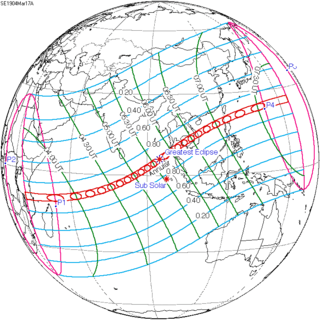Solar eclipse of April 8, 1902
| Solar eclipse of April 8, 1902 | |
|---|---|
 Map | |
| Type of eclipse | |
| Nature | Partial |
| Gamma | 1.5024 |
| Magnitude | 0.0643 |
| Maximum eclipse | |
| Coordinates | 71°42′N 142°24′W / 71.7°N 142.4°W |
| Times (UTC) | |
| Greatest eclipse | 14:05:06 |
| References | |
| Saros | 108 (76 of 76) |
| Catalog # (SE5000) | 9286 |
A partial solar eclipse occurred on April 8, 1902. A solar eclipse occurs when the Moon passes between Earth and the Sun, thereby totally or partly obscuring the image of the Sun for a viewer on Earth. A partial solar eclipse occurs in the polar regions of the Earth when the center of the Moon's shadow misses the Earth.
Related eclipses
Solar eclipses 1902-1907
Each member in a semester series of solar eclipses repeats approximately every 177 days and 4 hours (a semester) at alternating nodes of the Moon's orbit.
| Descending node | Ascending node | |||
|---|---|---|---|---|
| 108 | April 8, 1902 Partial |
118 | March 29, 1903 Annular | |
| 123 | September 21, 1903 Total |
128 | March 17, 1904 Annular | |
| 133 | September 9, 1904 Total |
138 | March 6, 1905 Annular | |
| 143 | August 30, 1905 Total |
148 | February 23, 1906 Partial | |
| 153 | August 20, 1906 Partial | |||
Notes
References
- Earth visibility chart and eclipse statistics Eclipse Predictions by Fred Espenak, NASA/GSFC
External links
| Wikimedia Commons has media related to Solar eclipse of 1902 April 8. |
This article is issued from Wikipedia - version of the 1/15/2016. The text is available under the Creative Commons Attribution/Share Alike but additional terms may apply for the media files.
